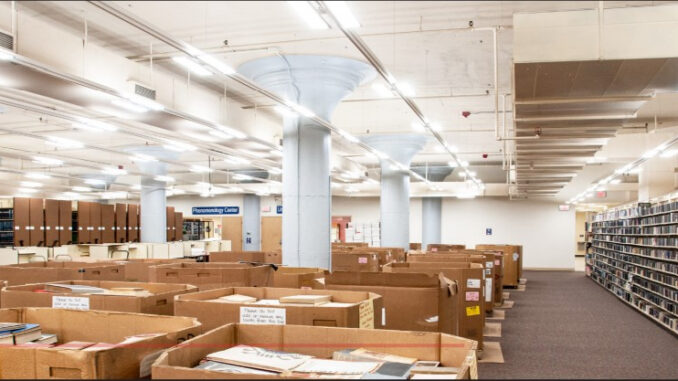
Elizabeth Sharp | Staff Writer
02/25/2021
Gumberg Library is starting a new chapter— one that includes significantly less books.
Gumberg is currently undertaking a collection review project that will condense the library’s print collection by 40-50% to accommodate the increasing need for socially distant study spaces during the winter pandemic months.
Gumberg Library has been opening more study spaces for students during the spring semester. Students have been encouraged to use study spaces around campus, but this has proven difficult due to COVID. The library’s goal is to continue to increase the number of study spaces available while also maintaining safe protocols.
Scott Buchanan, communication and engagement librarian at Gumberg Library, explained the library’s plan when reopening for the fall 2020 semester.
“Gumberg implemented protocols last fall to help mitigate the spread of COVID on campus, including: limiting our hours to allow for more cleaning/sanitization by our facilities crew, limiting browsing and check-outs to online only with contactless pickup, and de-densifying our study spaces,” Buchanan said.
In addition, Gumberg Library requires all students to socially distance when using the library and wear masks at all times when in the facility. Buchanan also detailed study space plans open for students during the spring semester with a continuation of all Fall 2020 semester protocols.
“Right now, we are outfitted with one chair per-table to ensure social distancing in our open study areas on floors 3-5,” Buchanan said. “We also temporarily transitioned most of our group study rooms to single study spaces, which are all available to reserve online.”
There are currently 27 reservable rooms in the facility that are regularly cleaned and sanitized. But with increasing numbers of students wanting to utilize these spaces, and there being a limit on the number of students allowed in each room, the library has come up with a way to quickly make more study space available.
“Floors 1 and 2 have been closed this semester due to collections maintenance being performed on those floors, including the shifting of books and shelving, and the addition of some compact shelving,” Buchanan said.
This project consists of a review of each source that is being considered for removal. As much more information becomes available online through databases and other library resources, the need for a large print collection decreases. Because of the removal of these print sources, the library is able to use this empty space to accommodate more students that need more places to study because of de-densified spaces due to COVID-19.
This process is also being utilized to ensure students have the necessary resources and spaces to study in time for finals. The library is working to expand and open the second floor to be able to accommodate the bump in the building that often occurs at time. The books and sources from this project will not be thrown away. They will instead be sent to Better World Books, an online bookseller, where they will be sold to other libraries, donated or recycled.
Availability and use are contributing factors to whether or not a print source will be removed. If something is available in OCLC, a global library cooperative, and it is not being used at Duquesne, this usually qualifies the source as a good candidate for removal.
Though it may seem surprising that the library is willing to give up so many print sources, this has actually been going on since 2006 when they undertook the first print journal collection review and has continued in some capacity each year since.
As of Feb. 5, the total number of items reviewed comes to 272,411, which is 69% of the total capacity. The total number of items left to review is 119,566 which is 31% of the total capacity. The current percentage of items actually removed from the library is 30%. The other 70% of items are planned to be removed by October 2021.




